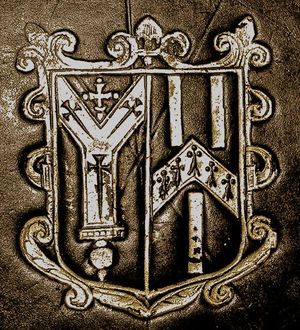Difference between revisions of "James Ussher 1581-1656"
| Line 27: | Line 27: | ||
[[Category:Clergy]] | [[Category:Clergy]] | ||
[[Category:Libraries Bequeathed to Institutions]] | [[Category:Libraries Bequeathed to Institutions]] | ||
| + | [[Category:All Owners]] | ||
Revision as of 22:11, 21 July 2020
James USSHER 1581-1656
Biographical Note
Born in Dublin, son of Arland Ussher, clerk in Chancery. BA Trinity College, Dublin 1598, fellow 1600, MA 1601, BD 1607, DD 1612, vice-provost 1616. In 1621 he became Bishop of Meath, after a period spent in London, and in 1625 Archbishop of Armagh. He was heavily involved in Irish ecclesiastical and political affairs during the succeeding decades, but moved to England after the Irish rising of 1641, spending time with the King in Oxford and elsewhere. Although aligned with the royal side, he was widely respected for his learning and piety by parliamentarians also. His last decade was largely spent in scholarly retirement; his reputation was established by earlier publications, particularly his Britannicarum ecclesiarum antiquitates (1639), but he published various later works on ecclesiastical history and Biblical chronology, including his Old Testament Annales (1650, 1654) with the calculation that the world began in 4004 BC.
Books
Ussher acquired books throughout his life, building up the greatest Irish library of his day, and during his time as a fellow of Trinity College he made trips to London to buy books for the College. He was in regular contact with the other leading scholars and antiquaries of his time (e.g. Cotton, Camden, Selden, and bought manuscripts from the library of Henry Savile after his death in 1617. Although his libary has been particularly celebrated for its extensive collection of medieval manuscripts, it also ran to ca.10,000 printed books, wide-ranging across subjects and languages as might be expected. In his Catalogi manuscriptorum, (1697), Edward Bernard attributed 340 manuscripts to Ussher's ownership.
Ussher intended to bequeath his library to Trinity College, Dublin, but financial pressures at the time of his death meant that it was left (as his only significant asset) to his daughter Elizabeth, wife of Sir Timothy Tyrrell. Negotiations for its sale then ensued, and after offers were received from abroad, Cromwell forbade its leaving the country. Sion College and the Bodleian Library were interested, but in 1657 it was agreed that the Army would find £2500 to buy it to establish a new library in Dublin. This plan foundered with the restoration, when the library was granted to Trinity College by the Irish parliament, notionally as the gift of Charles II. The library was stored in Dublin Castle in 1658-61, during which time it suffered some losses.
Characteristic Markings
Some of Ussher's books are marked with one of two very similar armorial stamps (though copies of his 1639 Britannicarum ecclesiarum antiquitates with an armorial reflect gifts).
Sources
- British Armorial Bindings.
- Ford, Alan. "Ussher, James (1581–1656), Church of Ireland archbishop of Armagh and scholar." Oxford Dictionary of National Biography.
- Fox, P., Trinity College Library Dublin: a history, Cambridge, 2014, ch.2.
- Fox, P. Treasures of the library, Trinity College Dublin, 1986.
- Towers, S. James Ussher in W. Baker (ed), Pre-19th century British book collectors, 1999, 357-64.
